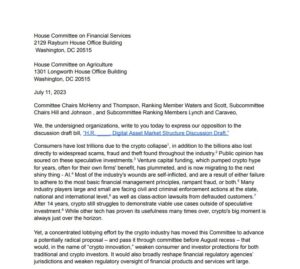
Watchdogs Oppose Proposed Crypto Market Regulation
A coalition of industry watchdogs based in the United States has united in opposition to the House Financial Services Committee’s proposed draft bill on the crypto market structure.
In detailed correspondence to the committee, groups such as Americans for Financial Reform and the Center for Responsible Lending asserted that crypto industry stakeholders had actively lobbied to favor the committee’s Digital Asset Market Structure Discussion Draft bill.
The watchdogs stated that the crypto industry lacked practical use cases beyond speculation.
Under the guise of crypto innovation, the letter accused the cryptocurrency market of attempting to obtain favorable legislation:
“Of particular concern is the proposed bill’s provision that would alter the SEC’s evaluation of regulatory rulemaking in all securities markets, compelling the agency to assess new rules based on the criterion of ‘innovation.‘”
The purpose of the comprehensive digital asset bill was to establish a regulatory framework for the crypto industry in the United States, including well-defined rules and guidelines.
Earlier reports indicated that committee chair Representative Patrick McHenry intended to hold a vote in July 2023.
The primary focus of the proposed legislation is the U.S. Securities and Exchange Commission’s (SEC) oversight of the regulatory framework.

In June 2023, the SEC initiated separate legal proceedings against two prominent cryptocurrency exchanges, Coinbase and Binance, renowned for their high trading volumes.
Surprisingly, traders quickly shrugged off the news, with minimal effect on cryptocurrency market prices.
Contrary to widespread demand, the watchdogs argued that Congress should support the SEC’s ongoing enforcement actions to “protect consumers.”
In contrast, various European and Asian jurisdictions actively work to accommodate crypto businesses leaving the United States.





